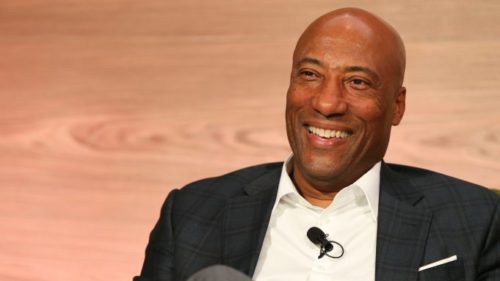Byron Allen on the 400th Anniversary Of Slavery In America
Share
Explore Our Galleries
Breaking News!
Today's news and culture by Black and other reporters in the Black and mainstream media.
Ways to Support ABHM?
By Byron Allen, Deadline

Editors Note: Byron Allen is founder, chairman and CEO of Entertainment Studios, one of the world’s largest privately held media companies. Allen, who is African American, contributed this to Deadline as his discrimination suit against Comcast, citing violations of the Civil Rights Act, heads toward a showdown in the U.S. Supreme Court.
Comcast/NBCUniversal and the Trump Department of Justice are asking the U.S. Supreme Court to roll back civil rights. It started with a racial discrimination case I brought against Comcast. After losing twice in the Ninth Circuit Court of Appeals, Comcast went to the U.S. Supreme Court. And now they’ve brought the Trump Administration along to take their side in the highest court, putting at risk all Americans’ civil rights for their own financial gain.
Comcast/NBCUniversal, the largest cable operator and residential broadband provider in the U.S., enjoys the image of a progressive, diverse media company, holding itself out as an organization that stands up to discrimination and gives voice to progressive viewpoints and people of color. It’s the same company that brings Rachel Maddow, Chris Hayes, Joy Reid and Lester Holt into your living room every day and unsparingly covers Donald Trump’s racist Twitter rants. If all you did was watch Comcast’s MSNBC and NBC programming, you would never know that the company is quietly attacking civil rights in the U.S. Supreme Court right now, in an effort to deny us a fair shot at doing business with the company and, in the process, gutting the Civil Rights Act of 1866 and its prohibition against racial discrimination in contracting.
But that’s what they’re doing. Perverting a key provision of the law that protects minority businesses at a time when people of color are under heightened attack. All for what Comcast says is in its best financial interest. While it is not unusual for a big corporation to defend itself in court, what makes this case different is the stark contrast between how Comcast presents itself to its viewers and subscribers on the one hand, and how it presents itself to the U.S. Supreme Court on the other. The very same company whose anchors, commentators and correspondents report on and excoriate Donald Trump for his racist statements, is arguing to the U.S. Supreme Court that African Americans, Latinos, and every other racial minority should have a harder time winning relief under the Civil Rights Act. And now Comcast has teamed up with Donald Trump to keep African-Americans and other minorities from achieving economic inclusion and equality…
Read full article here
More Breaking News here
View more ABHM galleries here











Comments Are Welcome
Note: We moderate submissions in order to create a space for meaningful dialogue, a space where museum visitors – adults and youth –– can exchange informed, thoughtful, and relevant comments that add value to our exhibits.
Racial slurs, personal attacks, obscenity, profanity, and SHOUTING do not meet the above standard. Such comments are posted in the exhibit Hateful Speech. Commercial promotions, impersonations, and incoherent comments likewise fail to meet our goals, so will not be posted. Submissions longer than 120 words will be shortened.
See our full Comments Policy here.